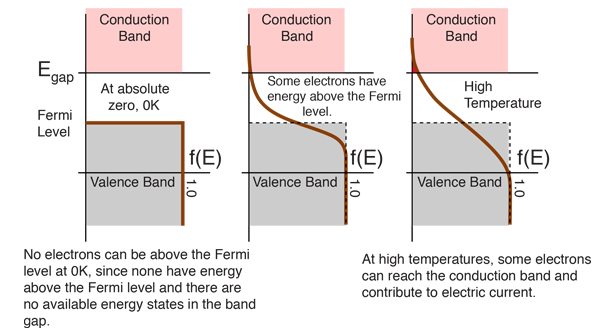Fermi level and Fermi function (original) (raw)
Fermi Function
The Fermi function f(E) gives the probability that a given available electron energy state will be occupied at a given temperature. The Fermi function comes from Fermi-Dirac statistics and has the form

The basic nature of this function dictates that at ordinary temperatures, most of the levels up to the Fermi level EF are filled, and relatively few electrons have energies above the Fermi level. The Fermi level is on the order of electron volts (e.g., 7 eV for copper), whereas the thermal energy kT is only about 0.026 eV at 300K. If you put those numbers into the Fermi function at ordinary temperatures, you find that its value is essentially 1 up to the Fermi level, and rapidly approaches zero above it.
The illustration below shows the implications of the Fermi function for the electrical conductivity of a semiconductor. The band theory of solids gives the picture that there is a sizable gap between the Fermi level and the conduction band of the semiconductor. At higher temperatures, a larger fraction of the electrons can bridge this gap and participate in electrical conduction.

Note that although the Fermi function has a finite value in the gap, there is no electron population at those energies (that's what you mean by a gap). The population depends upon the product of the Fermi function and the electron density of states. So in the gap there are no electrons because the density of states is zero. In the conduction band at 0K, there are no electrons even though there are plenty of available states, but the Fermi function is zero. At high temperatures, both the density of states and the Fermi function have finite values in the conduction band, so there is a finite conducting population.
Semiconductors for electronics
Reference
Simpson
Sec 4.7